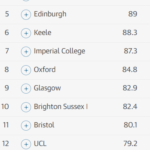Questions for Birmingham University Medical School Interview
The University of Birmingham, a distinguished public research university in Birmingham, England, Established in 1900, the university received its Royal Charter as the successor to Queen’s College, Birmingham, which was founded in 1825 as the Birmingham School of Medicine and Surgery. It also integrated Mason Science College, founded in 1875 by Sir Josiah Mason. Over the years, through strategic mergers and the foundation of Mason Science College, the medical school evolved and was integrated into the University of Birmingham by 1900. This merger marked the creation of the first English civic or ‘red brick’ university to receive its own Royal Charter, positioning it as the first English unitary university.
The medical school has played a pivotal role in the university’s development, contributing significantly to advancements in medical education and research. From its early days, focusing on practical anatomical studies, it has grown into a leading institution for medical research and education. The school has continually adapted to advancements in medical science, integrating modern technologies and methodologies into its curriculum and research initiatives.
The university as a whole, including its medical school, has a strong emphasis on research. This focus is reflected in its membership in both the Russell Group and Universitas 21, which facilitate collaboration and innovation on an international scale. The University of Birmingham’s commitment to research excellence is further evidenced by its ranking in the QS World University Rankings, where it holds the 80th position globally.

Medical School Interview Format at the University of Birmingham Medical School

For 2024 intake, MMI Interviews for the Birmingham Medical School will be conducted in person. The University of Birmingham Medical School utilizes Multiple Mini Interviews (MMIs) as a critical part of their selection process for medical students. MMI Interviews are designed to assess skills and attributes essential for a successful career in medicine and typically include six to seven MMI stations, each lasting about eight minutes with a mixed format of role-play, interviews, and calculation tasks. Each station most likely will have one or two examiners, one will interview and assess you while the other won’t interact with you but rather be an observer. Key skills and attributes assessed during the MMI include:
- Critical Thinking and Problem-Solving: Scenarios presented requiring interpreting clinical information and making appropriate conclusions.
- Communication Skills: In role-play scenarios, candidates must demonstrate ability to communicate including explaining complex information.
- Ethical and Moral Reasoning: Posed with ethical dilemmas to evaluate understanding of medical ethics and ability to navigate moral situations.
- Commitment to Medicine: Questions on motivation – candidates must show deep understanding and genuine interest in the field.
- Teamwork and Interaction: Role-play stations simulate interactions in both healthcare and social settings, assessing candidate’s ability to establish rapport, work collaboratively, and handle interpersonal challenges.
- Mathematical Ability: Possible computer-based calculation station tests basic GCSE-level math skills, focusing on clinically relevant scenarios.
- Resilience and Adaptability: Interview process is designed to evaluate how candidates cope with pressure and unexpected challenges.
Preparation for the MMI stations at the University of Birmingham involves staying informed on NHS hot topics, practicing role-play scenarios, and brushing up on basic math skills. The university emphasizes a well-rounded individual and uses a combination of the MMI and the UCAT to determine who moves forward and is offered a place.
Interview Questions For Birmingham Medical School
MMI Station 1 - General / Personal Statement Station
Why would you like to study Medicine?
Why would you like to study Medicine at the University of Birmingham?
Have you always wanted to be a doctor?
Why do you want to be a doctor, not a nurse?
Give an example of where you have worked in a team.
What role have you played in a team?
Describe your leadership skills.
How would your friends describe you?
Do you have any hobbies?
So I see in your work experience, you watched CT scans….tell me, what does CT stand for?
What would you do if someone was not pulling their weight in a PBL group
MMI Station 2 - Motiavtion and Insight nto Medicine
What have you learnt from your work experience in…?
Tell us about your volunteer activities. Did you encounter any obstacles or challenges in these activities? How did you overcome them?
What have you struggled with? What do you think you will struggle with at medical school?
What are the demands placed on doctors?
What makes a good doctor?
Give an example when you saw a doctor using good communication skills.
What have you done to show your interest in Medicine?
Tell me about a time that something went wrong? How did you deal with it?
MMI Station 3 - Roleplay Station
A prospective medical student has requested your advice on whether to apply to study Medicine and in particular whether s/he should apply to Birmingham Medical School. Over the next 6 minutes, discuss with the student their plans and whether they should apply to Birmingham Medical School.
MMI Station 4 - Data Analysis
What is the percentage of patients who had knee problems after undergoing the surgery based on the table?
Review the table/graph enclosed and explain your findings.
MMI Station 5 - Case article/Review
Whilst not being tested every year, previously this station has presented students with a short introduction to a topic relevant to health care and be expected to identify the issues that are of particular relevance to this topic.
MMI Station 6 - Ethical Dilemma
One liver transplant has been made available and there are two suitable patients who require the transplant. Patient A has………….and Patient B has…………Which of these two patients, would you allocate an organ to and why?
What are the pros and cons of having health information accessible online?
When do you think it would be right to break confidentiality as a Doctor?
MMI Station 7 - Science/Medicine
Tell us about the GMC?
What health issues do you think doctors cannot control in our area?






